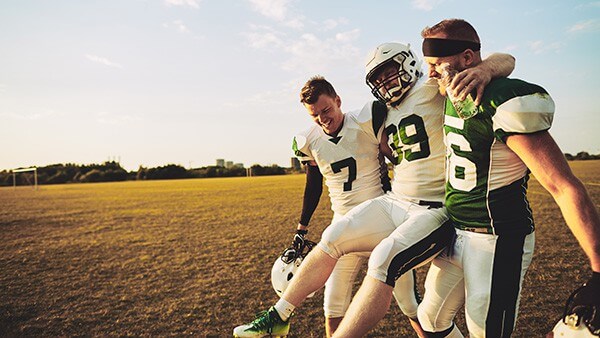 Although sports injuries are often preventable, they are a common occurrence in every sport.
Although sports injuries are often preventable, they are a common occurrence in every sport.
Many sports injuries are minor and cause only temporary discomfort and lost practice time, but injuries that occur when the body is under high levels of stress (such as falls and collisions) can be serious and have long-lasting effects.
Athletes who return to the field too soon run the risk of causing additional damage to their joints, which could lengthen recovery time and potentially lead to further injuries and difficulty with returning within a timely manner.
How do you know if your injury requires medical attention? Continue reading to find out.
What’s the Difference Between a Sprain and a Strain?
Sprains and strains are common sports injuries involving the soft tissue surrounding the joints. These injuries have very similar causes and symptoms, so it can be difficult to tell them apart.
A sprain occurs when a ligament connecting two bones together is overstretched or slightly torn. Knee, wrist, and ankle sprains are some of the most common injuries seen in athletes.
A strain, sometimes called a “pulled muscle”, occurs in the same way as a sprain but affects the muscle or the tendon that attaches the muscle to the bone. Sports-related muscle strains are most common in the thigh and groin.
Both injuries cause pain, swelling, and limited mobility. The key difference is that bruising is a sign of a sprain, while muscle spasms may indicate a strain.
A mild sprain or strain can typically be treated at home using the PRICE method (protection, rest, ice, compression, and elevation). However, if you hear a “pop” or if pain persists, you may have torn a ligament or ruptured a tendon. Medical attention is recommended to determine the extent of the injury.
Can a Torn Tendon/Ligament Heal on Its Own?
With proper care and plenty of rest, a mild ligament or tendon injury will often heal on its own. However, when a tendon or ligament is torn or ruptured, symptoms will likely persist and the injury may worsen with continued use.
Non-surgical treatment methods, such as rest, physical therapy, and anti-inflammatory medications, can help to improve function and relieve pain. However, immobilization with a brace or cast, surgery, or physical therapy may be required to restore full strength.
How Do I Know if My Injury Is Serious?
Many sports injuries have similar symptoms and can be very difficult to self-diagnose. Although minor injuries can often heal on their own over time, more serious injuries will require treatment.
The following symptoms may indicate a more serious injury:
- A popping or snapping sound or feeling
- Intense or ongoing pain or weakness
- Immobility or inability to bear weight on the affected area
- Immediate swelling or bruising
- Visible deformity
- Numbness or tenderness
If you experience any of these symptoms, seek medical attention as soon as possible. Your physician will be able to assess the severity of your injury, obtain X-rays if needed, and recommend the most effective course of treatment.
How Long Does It Take to Recover from a Sports Injury?
Early intervention is key when dealing with an athletic injury. Without proper treatment, injuries can worsen leading to the need for more invasive treatments, longer recovery periods, and (potentially) long-term damage.
The time it takes to recover from a sports injury is different for each person and depends on the type and severity of the injury. On average, minor injuries can typically heal in 6 to 12 weeks, while more serious injuries can take up to 12 months to fully recover. Your orthopedic specialist will be able to help guide you through the process and maximize recovery.
How Can I Speed Up Recovery?
Recovering from a sports injury takes time, but your commitment to your recovery can play a major role in your body’s healing process.
An appropriate conditioning program can help you accelerate your recovery and reduce the chance of re-injury. However, certain activities should be avoided as they can cause further damage. *Be sure to talk to your physician about what is best for you and your body.
When you sustain any type of injury, it is essential to pay attention to your body and give it the time it needs to recover. Don’t forget to get some rest, and always make sure to follow your doctor’s recommendations since their goal is the get you back in action as soon and as safely as possible.


